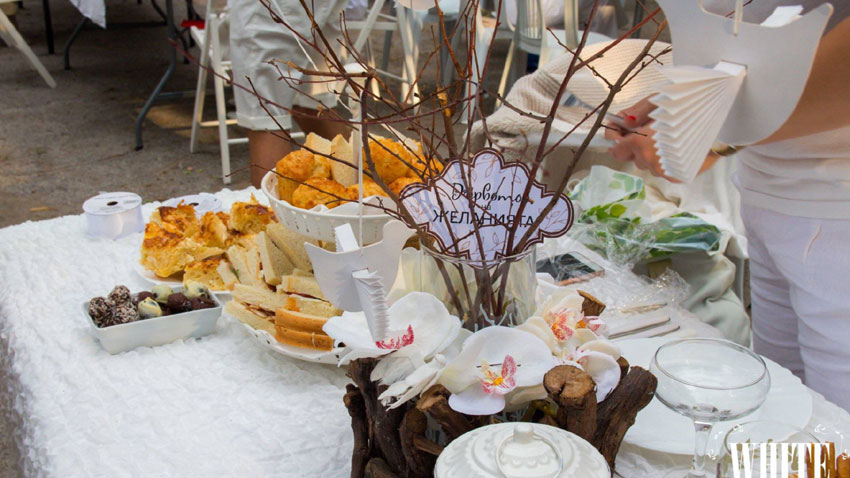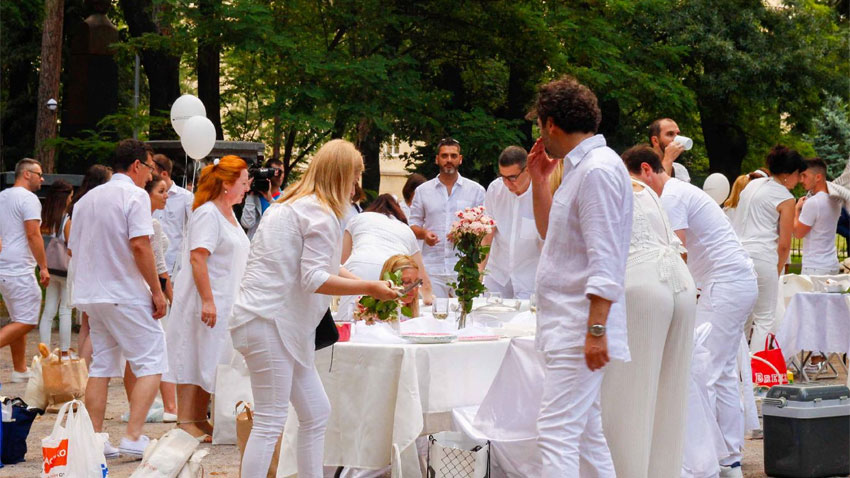In 1988 Frenchman François Pasquier invited a group of friends to an elegant outdoor dinner at Bois de Boulogne in Paris, having them dressed in white so that they could easily spot each other. However, no one expected at that time that years later the Dîner en Blanc will become a worldwide event and a ritual filled with mystery, finesse and good manners.
Each summer thousands of people in Paris, New York, Hamburg, Milano, Hong Kong, Montreal, Johannesburg and other cities worldwide gather in public and set up a temporary, chic dining area. The guests come dressed in white.
The White Dinner (Dîner en Blanc) concept began thirty years ago in Paris, the organizer of White Dinner in Bulgaria Elena Spirina told Radio Bulgaria. Diners are required to bring their own food and drinks and picnic supplies. The point is to create a beautiful space around us and demonstrate initiative. One of the event’s messages is linked with ecology, because no plastic items are allowed. People bring with them reusable utensils instead and have to pick the waste at the end of the dinner. The main purpose of the White Dinner is to teach people to clean after themselves, create beauty and be active, because everyone is responsible for the beautiful atmosphere and emotion. In other words, we are not mere consumers who go out for a dinner in a restaurant. On the contrary - we create the event.

Over the course of the evening guests experience the beauty and value of their city’s public places by participating in the unexpected. Guests are brought together from diverse background and the love of beauty. They engage one another knowing they are taking part in a truly magical event. The location of the event remains undisclosed until the last moment.
Mystery is one of the main elements of this event, because the participants do not know in advance where their chic dinner will take place, Elena Spirina says. In fact, this is one of the things that make people participate in the White Dinner. People are filled with positive expectations joining an unknown person who takes them to the location of the dinner. Besides, they see in the course of twenty minutes only how the event is created. It is incredible to see how an empty area fills in no time with two or three hundred people bringing their own tables, chairs, table clothes, food and beverages and everything looks so beautiful.

Last year 320 people attended for the first time the White Dinner in the Military Academy Park in Sofia.
The first White Dinner in Bulgaria went well. We did not expect that the participants will show such a big enthusiasm, Elena Spirina went on to say. Most of them learned about the event when they were abroad. The participant enjoyed the dinner on beautiful tables covered with flowers, feathers and candles. The meals were delicious. Some of the participants brought fruit pies and cakes, others preferred cheeses and fruits. Some people even brought homemade food in bain-maries.
English version: Kostadin Atanasov
Photos: whitedinner.bgEvery Bulgarian school abroad has its own story, and that of the Rodna Stryaha Bulgarian school in Cyprus began in 2015. Its foundations are built on the dream of a Bulgarian teacher - when one day Bulgarian children decide to return to their..
President Rumen Radev will today attend the opening ceremony of Forest Week in front of St Alexander Nevsky Cathedral. The theme of this year's celebrations is "A century of eternal creation, preservation and care!" This year marks the 100th..
For 100 years, foresters in Bulgaria have been organizing Forest Week. A concert entitled “A century of eternity” on 7 April will give the official start to the initiative dedicated to the planet’s lungs. And though it has been a century since..
Students block the entrances to the Radio and Television of Serbia For 12 days now, students and citizens have been blocking the entrances to..
Cambridge Day 2025 - one of the leading events for English language teachers in Southeast Europe - takes place today at the Balkan Hotel in Sofia. For..
A new book "Bulgarian communities in Albania and Kosovo. Socio-political processes and demographic consequences (1913-2024)" was..

+359 2 9336 661
